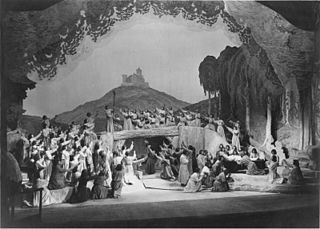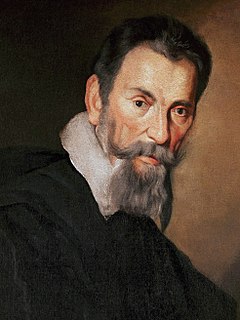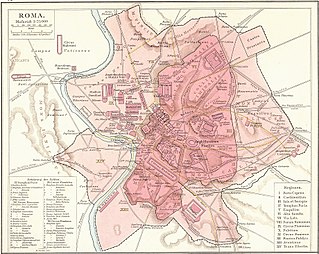Related Research Articles

Venus is a Roman goddess, whose functions encompassed love, beauty, desire, sex, fertility, prosperity and victory. In Roman mythology, she was the mother of the Roman people through her son, Aeneas, who survived the fall of Troy and fled to Italy. Julius Caesar claimed her as his ancestor. Venus was central to many religious festivals, and was revered in Roman religion under numerous cult titles.
Dance of the Hours is a short ballet and is the act 3 finale of the opera La Gioconda composed by Amilcare Ponchielli. It depicts the hours of the day through solo and ensemble dances. The opera was first performed in 1876 and was revised in 1880. Later performed on its own, the Dance of the Hours was at one time one of the best known and most frequently performed ballets. It became even more widely known after its inclusion in the 1940 Disney animated film Fantasia where it is depicted as a comic ballet featuring anthropomorphized ostriches, hippos, elephants, and alligators.

Il ritorno d'Ulisse in patria is an opera consisting of a prologue and five acts, set by Claudio Monteverdi to a libretto by Giacomo Badoaro. The opera was first performed at the Teatro Santi Giovanni e Paolo in Venice during the 1639–1640 carnival season. The story, taken from the second half of Homer's Odyssey, tells how constancy and virtue are ultimately rewarded, treachery and deception overcome. After his long journey home from the Trojan Wars Ulisse, king of Ithaca, finally returns to his kingdom where he finds that a trio of villainous suitors are importuning his faithful queen, Penelope. With the assistance of the gods, his son Telemaco and a staunch friend Eumete, Ulisse vanquishes the suitors and recovers his kingdom.

Tannhäuser is an 1845 opera in three acts, music and text by Richard Wagner, based on two German legends: Tannhäuser, the legendary medieval German Minnesänger and poet, and the tale of the Wartburg Song Contest. The story centers on the struggle between sacred and profane love, and redemption through love, a theme running through much of Wagner's mature work.

The Capitoline Museums is a single museum containing a group of art and archaeological museums in Piazza del Campidoglio, on top of the Capitoline Hill in Rome, Italy. The historic seats of the museums are Palazzo dei Conservatori and Palazzo Nuovo, facing on the central trapezoidal piazza in a plan conceived by Michelangelo in 1536 and executed over a period of more than 400 years. The history of the museums can be traced to 1471, when Pope Sixtus IV donated a collection of important ancient bronzes to the people of Rome and located them on the Capitoline Hill. Since then, the museums' collection has grown to include a large number of ancient Roman statues, inscriptions, and other artifacts; a collection of medieval and Renaissance art; and collections of jewels, coins, and other items. The museums are owned and operated by the municipality of Rome.

The Golden Apple is a musical adaptation of parts of the Iliad and Odyssey with music by Jerome Moross and lyrics by John Treville Latouche. The musical premiered Off-Broadway in 1954 and then transferred to Broadway.
Music Theater Works is a resident professional not-for-profit musical theatre company in Evanston, Illinois. It was founded in 1980 by Philip Kraus, Bridget McDonough, and Ellen Dubinsky.

The Capitoline Venus is a type of statue of Venus, specifically one of several Venus Pudica types, of which several examples exist. The type ultimately derives from the Aphrodite of Cnidus. The Capitoline Venus and her variants are recognisable from the position of the arms—standing after a bath, Venus begins to cover her breasts with her right hand, and her groin with her left hand.
Victor Albert Davies is an award winning Canadian composer, pianist, and conductor, best known for his opera Transit of Venus and The Mennonite Piano Concerto.

The Oregon Chorale is an American concert choir based in Hillsboro in the U.S. state of Oregon. Founded in 1985 as the Washington County Chorale, the 60 person group performs in the Portland metropolitan area, as well as tours in Europe. The group presents music ranging from classical and opera music to folk and contemporary numbers.

These lists show the audio and visual recordings of Il ritorno d'Ulisse in patria by Claudio Monteverdi. The opera was premièred in Venice in 1640, initially in five acts, and was then performed in Bologna before returning to Venice for the 1641–42 season. The music was subsequently lost; modern productions of the opera have been based on editions derived from the sole manuscript score, a three-act version discovered in Vienna in the 19th century. Performances were rare until the 1970s, when after stagings in Vienna and at Glyndebourne, both of which were recorded, the work entered the operatic mainstream. Since that date recordings have been issued regularly, in five-act, three-act and two-act versions.

The Temple of Venus Erycina was a temple on the Capitoline Hill in Ancient Rome dedicated to Venus Erycina. This was an aspect of the goddess Venus. Later this temple was probably called the Temple of the Capitoline Venus. There was another temple with the same name in Rome, the Temple of Venus Erycina.

Venus with a Mirror is a painting by Titian, now in the National Gallery of Art in Washington, DC, and it is considered to be one of the collection's highlights.

Frederick Douglass is an opera in three acts composed by Ulysses Kay to a libretto by Donald Dorr. Its story is a semi-fictionalized account of the final years in the life of Frederick Douglass after his marriage to his second wife, Helen Pitts Douglass. The opera premiered on April 12, 1991 at Newark Symphony Hall performed by the New Jersey State Opera in a production directed by Louis Johnson and designed by Salvatore Tagliarino.
Frederick Douglass was an African-American social reformer, abolitionist, orator, writer, and statesman. Frederick Douglass may also refer to:
The Boor is an opera in one act composed by Ulysses Kay to a libretto based on Anton Chekhov's comic play, The Bear. Kay wrote the libretto himself basing it on an English translation of the play by the composer Vladimir Ussachevsky. The opera was commissioned by the Koussevitsky Foundation of the Library of Congress and is dedicated to the memory of Natalie and Serge Koussevitzky. It premiered on 2 April 1968 in concert version at the University of Kentucky in Lexington, Kentucky.
Jubilee is an opera in three acts composed by Ulysses Kay to a libretto by Donald Dorr. The opera is based on the narrative in Margaret Walker's 1966 novel Jubilee which described her biracial grandmother's experiences as a slave and then as a free woman during the Reconstruction Era. It was first performed on 20 November 1976 in Jackson, Mississippi by Opera South who had commissioned the work for the U.S. Bicentennial. The premiere performance was conducted by James DePreist with Hilda Harris as Vyry, the opera's protagonist. Jubilee was revived by Opera South in 1977 and then disappeared after Margaret Walker threatened to sue if there were any further performances.
The Juggler of Our Lady is an opera in one act composed by Ulysses Kay to a libretto by Alexander King. The libretto is based on Robert O. Blechman's 1953 book The Juggler of Our Lady. A Medieval Legend. Composed in 1956, the opera premiered on 23 February 1962 in New Orleans, Louisiana performed by the Xavier University Opera Workshop. It was performed again in 1972 by Opera/South in Jackson Mississippi in a double bill with William Grant Still's opera Highway 1, U.S.A.. The 1972 performance of both operas was also broadcast on Voice of America.
References
- ↑ Griffel, Margaret Ross (2012). Operas in English: A Dictionary, p. 77. Scarecrow Press. ISBN 0810883252
- ↑ Chicago Tribune (18 February 1971). "Illini Festival Set", Section 2, p. 2-13
- ↑ Columbia University Libraries. Ulysses Kay: The Capitoline Venus. Retrieved 28 February 2016.
| This article about an English language opera is a stub. You can help Wikipedia by expanding it. |